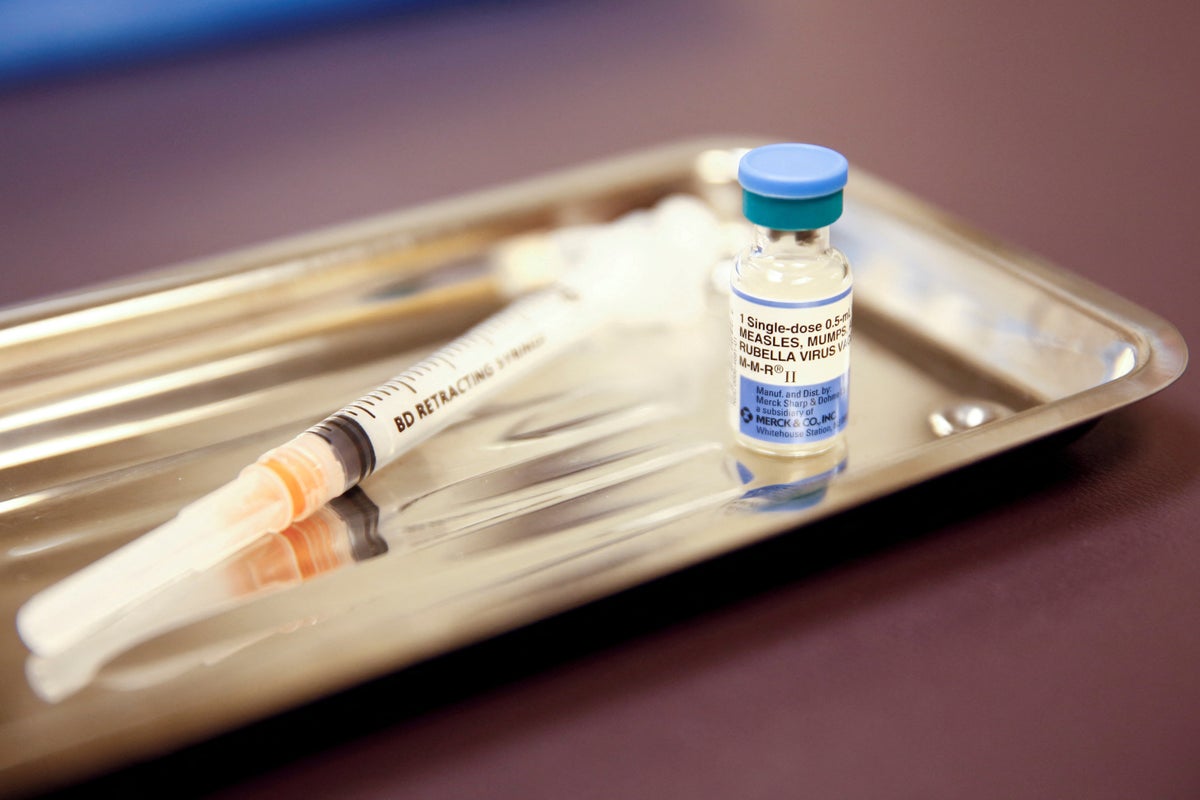
Jim O’Neill, Acting Director of the CDC and Robert F Kennedy Jr’s Deputy Health and Human Services Secretary, has called for the MMR vaccine – combining shots for measles, mumps and rubella – to be broken up into three separate jabs.
O’Neill echoed comments from President Donald Trump in a post on X on Monday in which the commander-in-chief offered advice to pregnant women, including a call to “break up the MMR shot into three totally separate shots (not mixed!)”
“Thank you POTUS for your leadership,” O’Neill wrote in response. “I call on vaccine manufacturers to develop safe monovalent vaccines to replace the combined MMR and ‘break up the MMR shot into three totally separate shots.’”
Neither Trump nor O’Neill offered any scientific rationale for their calls to break up the shot, and it was not clear whether the latter’s social media pronouncement should be read as an official directive.
Andrew Nixon, HHS Communications Director, has since told The Independent: “Deputy Secretary O’Neill agrees with President Trump that immunizations for measles, mumps, and rubella would be best administered as three separate vaccines.
“Standalone vaccinations can potentially reduce the risk of side effects and can maximize parental choice in childhood immunizations.”
The MMR vaccine is manufactured by the pharmaceutical giants Merck and GSK and was first licensed in the U.S. in 1971, following the consolidation of three separate shots that had been licensed in 1963, 1967, and 1969, respectively.
Combined shots have become standard practice in the intervening decades, and scientists have stated that there would be no advantage in reverting to the monovalent jabs of the 1960s, which could instead disrupt individuals’ adherence to vaccine schedules and ultimately encourage the diseases they were designed to prevent.
“I think that that would not be met with any enthusiasm by, or acceptance by, either providers or parents who would see their children inoculated with substantially more doses of vaccine,” William Schaffner, an epidemiologist and professor of public policy at Vanderbilt University, told The Hill when asked about O’Neill’s call being taken up.
William Moss, a professor of epidemiology at Johns Hopkins University’s Bloomberg School of Public Health, went further, saying: “These monovalent vaccines are not even available, and I do not envision that vaccine manufacturers are going to want to produce these monovalent vaccines – particularly if they need to be studied in placebo-controlled trials as the Department of HHS has called for.”
Merck agreed with both men in a statement of its own: “Use of the individual components of combination vaccines increases the number of injections for the individual and may result in delayed or missed immunizations.”
Trump and Kennedy have vowed to find the root cause of autism and, in 1998, an attempt to tie the MMR vaccine to the condition was made by the discredited British gastroenterologist Andrew Wakefield, whose paper on the subject, published in The Lancet, was subsequently retracted in full in 2010 after scientists were unable to replicate the studies he cited and branded its findings “incorrect”.
Wakefield is no longer allowed to practice medicine in the U.K. and has since relocated to Texas, where he has repositioned himself as a medical martyr and “father of the anti-vaccine movement.”
He was seen alongside Kennedy at anti-vax rallies, and an epidemiologist who recently left the CDC told The Times last month that he remains the secretary’s “North Star.”
“From what I understand he’s not officially advising RFK Jr, it’s not like they talk every day, but RFK has been guided for some time by Wakefield’s research,” they said.
“Wakefield is the chief architect of a body of work that Kennedy believes and follows to this day.”
Speaking to The Independent in 2018, Wakefield revealed he also has connections to the Trump: “I met him once before the [2016] election, when he was running for the presidency. We had a meeting in Florida. We were there, four of us representing the issue of autism and its link to immunisation.
“He interjected and said, ‘You don’t need to tell me that vaccines cause autism. I’ve seen it, I’ve seen it personally’. We went on to discuss the issue of the autism crisis… He said if he was to be elected he’d do something about it.”
Much more recently, Trump expressed Wakefield and Kennedy-influenced vaccine skeptic sentiments as he returned to Washington from Charlie Kirk’s memorial service in Arizona.
“Vaccines are very interesting,” the president said. “They can be great, but when you put the wrong stuff in them, you know… Children get these massive vaccines like you’d give to a horse.
“And I’ve said for a long time, I mean, this is no secret – spread them out over five years. Get five shots, small ones.
“Did you ever see what they give? I mean, for a little baby to be injected with that much fluid, even beyond the actual ingredients, they have sometimes 80 different vaccines in them. It’s crazy.”
